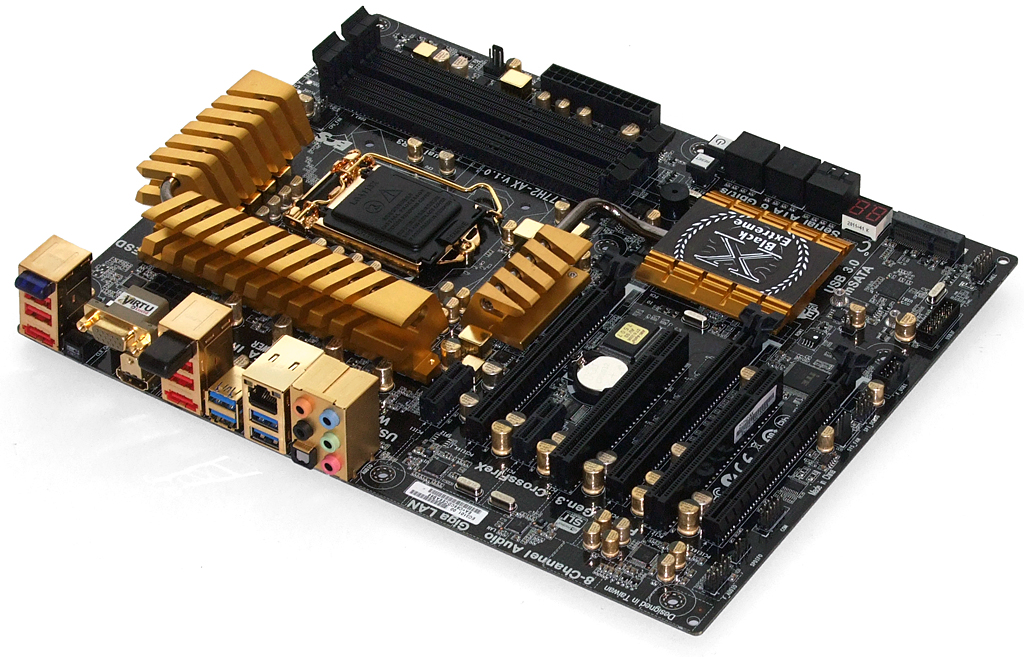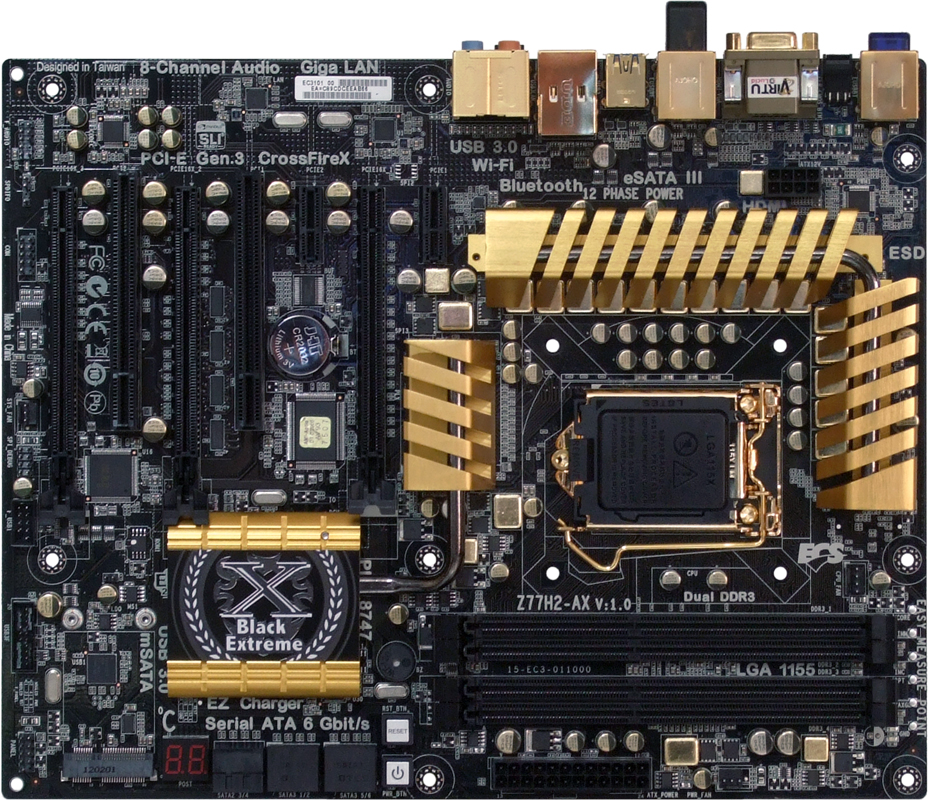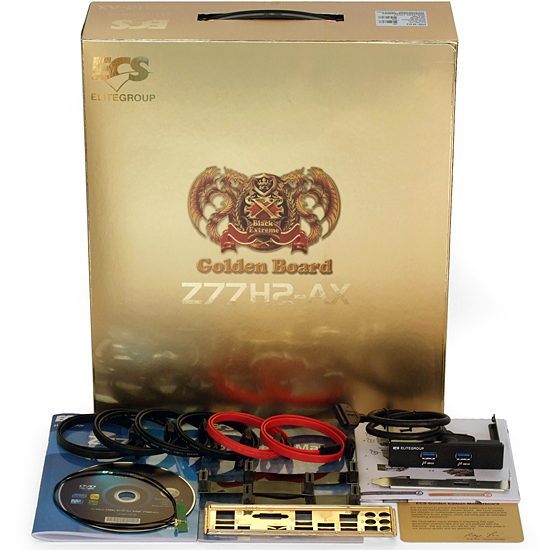Six $220-280 Z77 Express-Based Motherboards, Reviewed
Expanded graphics card support, enhanced on-board features that include Thunderbolt on some models, and more-robust voltage control are all good reasons to consider paying a little extra for a higher-end motherboard. Today we examine five top choices.
ECS "Golden Board" Z77H2-AX
ECS' flagship Z77H2-AX is the only board in today’s comparison to include the 48-lane PCIe 3.0 bridge needed to enable three-way SLI. At the time it was delivered, it was also one of only two sub-$280 Z77 Express-based boards equipped with this extremely exclusive features.
Naming issues still plague ECS though, as each step up in model number brings with it a reduction in price and features. Heck, the firm even replaces the word Budget with Deluxe in several models, adding the word Black to the packaging of boards that aren’t part of its Black Edition high-end line. The Golden Board label still represents its top-end parts, but those words only show up on the company's box, and not in the model number.
And so, the least-impressive name denotes the firm's most expensive products, from gold-plated connector shells and pins to the previously-mentioned PCIe bridge, integrated Wi-Fi, Bluetooth, and dual eSATA ports.
ECS adds a CLR_CMOS button to the Z77H2-AX's rear I/O panel, but does not give it a second gigabit network controller. Stranger still, the company puts VGA output on a board purchased by enthusiasts who'd much rather see DVI or DisplayPort.
Note that the 48-lane PEX 8747 chip is divided up into 16 lanes on the controller side and 32 lanes on the device side. A row of four two-lane switches above the platform's second 16-lane slot allows the third 16-lane slot to borrow eight lanes whenever a card is installed there, taking the board from x16/x16/x0 to x16/x8/x8 mode. Moreover, not wasting any of the chipset’s eight PCIe 2.0 lanes on a x16 slot gives ECS the opportunity to design its Z77H2-AX without the need to switch off certain devices to enable others. We count seven slots or devices connected to the Z77 chipset's eight PCIe 2.0 lanes.
Most of ECS' boards have an empty spot where the Port 80-style diagnostics display should have gone, but the Z77H2-AX actually has the real thing for reporting system status. That’s especially handy for troubleshooting an open test bench, as are the on-board power and reset buttons, and voltage detection points along the motherboard’s top edge.
Four of the Z77H2-AX’s internal SATA connectors are rated for 6 Gb/s data rates, since two of them employ a third-party controller. One of the Z77’s missing SATA 3Gb/s ports is re-assigned to an mSATA slot, while the other remains missing in action.
Get Tom's Hardware's best news and in-depth reviews, straight to your inbox.
The Z77H2-AX’s layout is almost as good as its features, with three spaces separating the first and second graphics card slots. But USB 3.0 header placement is the elephant in ECS' design room. Because it's so close to the third graphics slot, front-panel USB 3.0 and three-way SLI or CrossFire are mutually-exclusive features.
The Z77H2-AX includes four black and two red SATA cables, a USB 3.0-to-3.5” bay adapter, three SLI bridges, and a front-panel Wi-Fi antenna.
Current page: ECS "Golden Board" Z77H2-AX
Prev Page Sabertooth Z77 Firmware Next Page Z77H2-AX Software-
roberta As u have reviewed SIX (6) motherboards, the article's title should be:Reply
"Six $220-280 Z77 Express-Based Motherboards, Reviewed" -
mayankleoboy1 No SATA and USB tests ? data transfer speed differences will typically be noticable in everyday usage.Reply
Also, the time taken to show the windows loading screen/ BIOS page.. -
admit it.Reply
you really liked the black/grey dimms and PCI slots of the gigabyte better than the blue/black of the MSI! -
Crashman robertaAs u have reviewed SIX (6) motherboards, the article's title should be:"Six $220-280 Z77 Express-Based Motherboards, Reviewed"Let's see what the article says:ReplyThe one motherboard in today’s line-up with a 48-lane PCIe 3.0 bridge is ECS’ Golden Z77H2-AX. Unfortunately, this platform climbed $40 beyond the budget limit of today’s round-up in the time we've been reviewing it. We're tired of seeing board vendors playing pricing games based on our review schedule (this isn't the first time we're seeing a curiously-timed price move). So, since we put the work in to review ECS' submission, we're including our already-gathered data and simply withholding the board from any award candidacy.
mayankleoboy1No SATA and USB tests ? data transfer speed differences will typically be noticable in everyday usage.Also, the time taken to show the windows loading screen/ BIOS page..Would have covered windows load time except that it wasn't markedly different. That is, after disabling empty SATA controllers. If you count the time that it takes to get the "No Device Found" error on boards that have extra SATA controllers, you're penalizing a board for having more features.
Andrew Ku tests drive controllers. I'm trying to get him to "write the book" on controller performance, since dozens of boards use only a few different controllers. As for testing things like Z77 controller performance on board A vs Z77 controller performance on board B, it's a waste of time unless something is broken. So the article looked for "broken stuff". See the red bar on the first chart:
http://www.tomshardware.com/reviews/z77x-up5-th-z77a-gd80-z77-oc-formula,3305-22.html
With nothing broken, there's no excuse to test the Z77 controller six times. Back to me begging Andrew Ku for a comprehensive comparison of every SATA controller currently available on mainstream-brand enthusiast boards.
-
JeanLuc Arghh! Why the hell are you overclocking the base clock on Z77!! That will most likely cause permanent damage to your CPU.Reply -
You left out a key aspect for overclockers which is vcore offset.Reply
This allows ocer's to achieve higher overclocks while still retaining the power saving functions, instead of being forced to either reduce the overclock, or be forced to run high voltage 24/7.
MSI doesn't have this key feature. -
Onus I would think that the Sabertooth's five year warranty merits at least a mention in any value conclusion.Reply
-
luciferano JeanLucArghh! Why the hell are you overclocking the base clock on Z77!! That will most likely cause permanent damage to your CPU.Reply
Overclocking the BLCK is very unlikely to cause any damage, it's just likely to not give much of a stable overclock. -
Crashman jtt283I would think that the Sabertooth's five year warranty merits at least a mention in any value conclusion.I actually missed that, having checked the lesser brands just to make sure those still had their three year warranty. Will add it.Reply



